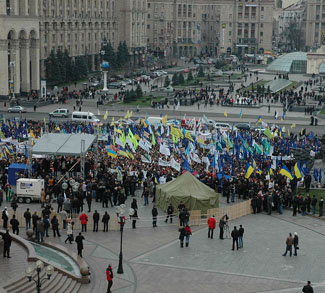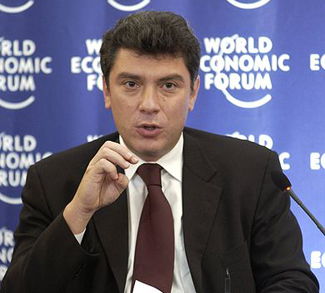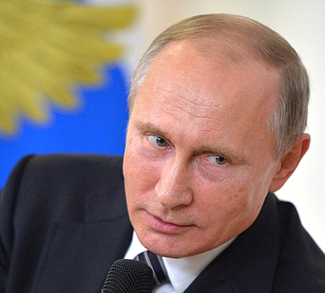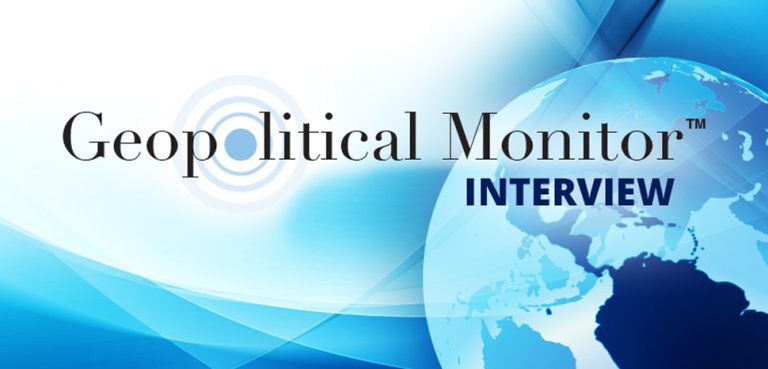Borys was a successful entrepreneur who built up a business producing grapes and berries by visiting plantations in Italy and California and replicating their production techniques on his own sun-kissed farm above the majestic Dnipro River in southern Ukraine. He worked with small farmers and credit unions across the region, selling saplings on credit to small holders and providing them with the know-how to produce high-value products for the local market. In short, he was a driver of economic development in a rural Ukraine that, since the collapse of the Soviet system, has reverted in large part to nineteenth-century subsistence patterns.
In June 2013 Borys disappeared. It is rumoured that he died in police custody, having refused to hand over his business to third party interests, but in Yanukovych’s Ukraine, it is better not to ask too many questions.
Borys’s fate is symptomatic of Ukrainian President Yanukovych’s demonstrated goal of turning back the clock on slender social gains made by the country since the 2004 Orange Revolution, when his rigged electoral victory was overthrown by popular protest. This article provides an overview of some of President Yanukovych’s key initiatives since popular disillusionment with Orange Revolution leaders gave him a slim majority in the presidential elections of February 2010, all of which have contributed to the current popular uprising and political standoff in Ukraine.
‘Administrative reforms’ and ‘verticals of power’
Using networks established during his rise through eastern Ukraine’s Donetsk regional administration, on winning the presidency Yanukovych moved quickly to establish what is known as ‘the Family’- a grouping of family members and cronies that now dominates government and the judiciary and have since enriched themselves with staggering voracity.
After packing the Constitutional Court with his supporters, he proceeded to revoke constitutional amendments made as part of the 2004 Orange Revolution compromises, returning Ukraine to presidential rule and ensuring that both the government and parliament were directly under his control.
For good measure, he also jailed firebrand opposition leader Yulia Tymoshenko, his fierce rival since the Orange Revolution, who he saw as the main threat to his consolidation of a ten year reign.
Simultaneously he installed heavy-handed supporters as governors of each of Ukraine’s 24 regions and awarded his most-trusted lieutenant with the prize of Crimea. These godfather-governors purged regional administrations, subdued legislatures (the speaker of the Crimean parliament was soon behind bars), appointed district head-men and in turn set about enriching themselves.
By the summer of 2010, only municipal and village councils were still independent. Yanukovych therefore re-wrote the law on local elections to exclude opposition parties and initiated a campaign of intimidation in which elected mayors were frog-marched from their offices in broad daylight by police and thugs in balaclavas to face a series of trumped up lawsuits.
To preserve their political careers, property and avoid prosecution, local elites quickly converted to the Party of Regions and the ‘bluing’ of the political map in the October 31 2010 local elections was stunning. Simultaneously, so-called ‘administrative reforms’ re-sculpted government institutions and lines of reporting to establish ‘verticals of power.’ The new presidential system had acquired an authoritarian domination of Ukraine with highly uncharacteristic deftness and savvy.
The Family’s long last supper
Since establishing total control of state organs, the extended Family has indulged in a three-year shakedown of Ukraine, with blithe disregard for whether assets belong to the state, private companies or individuals. In doing so, they also succeeded in effectively driving out domestic and foreign investment from the country.
The fate of Borys is a brutal if small-scale, rural example of tactics used as the extended Family and freelance criminals have become adept in the art of corporate raiding, expertly applying what entrepreneur and owner of the HC Donbass ice-hockey team Boris Kolesnikov refers to as “the triangle of death,” comprising of the police, the prosecutor, and the courts.
Even their hometown of Donetsk has not been spared. “We are used to rapacious governments, but these guys have gone totally over-the-top,” complained a taxi driver in the heavy-industrial heartland of the Party of the Regions. And ‘old monied’ oligarchs and former Yanukovych supporters from the region, including Ukraine’s wealthiest magnate, Rinat Akhmetov, have begun distancing themselves from the Family, as their fortunes too become a focus of attention.
The abuse of state assets and misappropriation of state funds is highlighted by the tale of Mezhyhirya, which prior to 2010 was a pristine 140 hectare forest park on the banks of the Dnipro River, outside Kyiv. Today it is, to all extents and purposes, the walled personal estate of family Yanukovych, resplendent with the recently-constructed and fabulously expensive Palace on the Water, yacht marina and helicopter pads, allowing this ‘father of his people’ to fly directly to his Presidential Administration in the centre of the capital.
Robbed even of its dream, the nation awakes, and not amused
In short, Ukraine has slipped away from the slender gains of its 2004 Orange Revolution and into a state of institutional banditry without accountability or recourse to justice. At the same time its population of 45 million has been increasingly exposed to the rule of law and attendant socio-economic progress of its European neighbours. They have seen for themselves the transformation of neighbouring Poland, Slovakia and Hungary and are witnessing the ongoing rebuilding of Romania, all of which they border, with which they share a common history and some of which they have historically outperformed. They see their old rival Turkey ahead of them on the road to Europeanization and now even Georgia and Moldova too. And it hurts.
The rejection of the EU trade pact by Yanukovych last month, by robbing the Ukrainian people of their dream for humanity, rule of law and hope for the future, was the final straw, the final act of betrayal by the Yanukovych regime, for which forgiveness will be all but impossible.
The EU, blindsided again, should listen to the protesters
Apparently ignorant of the Ukrainian reality, the West rewarded the Yanukovych regime this year with chairmanship of the OSCE, which promotes European democratic values. And last week, while Western leaders were flocking to bask in the reflected dignity of the icon of freedom Nelson Mandela, riot police were clubbing students and journalists on the streets of Kyiv.
The EU would do better to listen to the protesters and the reasoned and balanced statements made through www.maidanua.org. The protesters know better than anyone what they are up against. They know that the greed of their oppressors turns their bank accounts and estates into their Achilles heel. The West should impose sanctions in the form of visa bans and asset freezes on the Family, in the first instance on the minister responsible for violence against peaceful protests. The scapegoating of minor officials and municipal stooges by the government, leaves both those who clubbed and those responsible emboldened by their continued impunity.
The opinions, beliefs, and viewpoints expressed by the authors are theirs alone and don’t reflect any official position of Geopoliticalmonitor.com.




